By Rick VanSickle
The team at 40 Knots Winery in B.C.’s Comox Valley remains steadfastly true to their vision — to grow ultra-premium grapes on Vancouver Island and create clean, ethical wines that showcase the unique sun-kissed, sea-swept terroir.
Note — Also in this Canadian Wine Report: We review Culmin’s flagship red, the Hypothesis 2015, plus news for PEC’s Sandbanks winery sold to Arterra, Hester Creek winemaker retires, and a new Master of Wine from B.C.
That pursuit “guides us in every step we take (with) farming, cellar management, crush pad operation, our store, our delivery to the customer and our promise to protect the environment,” owners Layne Robert Craig and Brenda Hetman-Craig say.
“Some of the greatest vineyards in the world are grown near oceans with the salt air embedding the Burgundy oak. Great wines are not made in the tank and the barrel. Great wines come from the vineyard.”
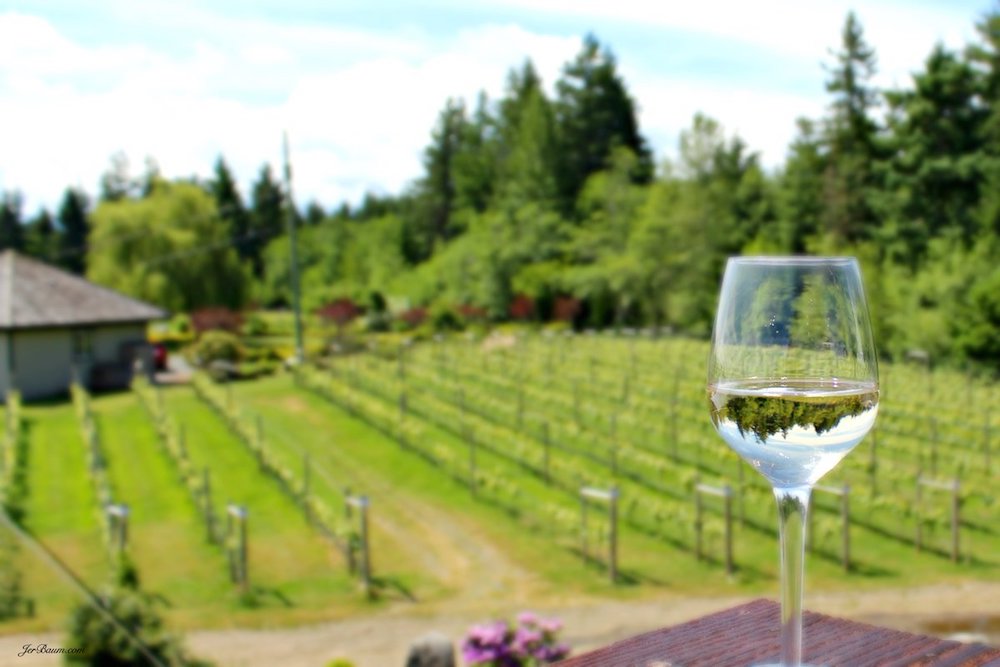
40 knots is one of the largest grape wineries in the Comox Valley and one of the largest on Vancouver Island. Located on 24 acres, on a slope facing the Salish Sea, the wines crafted there are shaped by a windswept, sun-soaked microclimate. They grow four noble varieties: Pinot Noir, Pinot Gris, Chardonnay and Gamay Noir and also grow two German hybrids, Schonberger and Siegerrebe, and one French hybrid, Pinot Auxerrois.
The winery has made strides toward sustainability by evaluating the environmental impact of each process, each procedure, and each purchase before any decisions are made. Partnering and collaborating with like-minded businesses has been key to their success. “Our sheep, chickens, geese, and Ziggy (the farm’s whippet pooch and chief security officer) all have a hand producing clean, sustainably made wines.
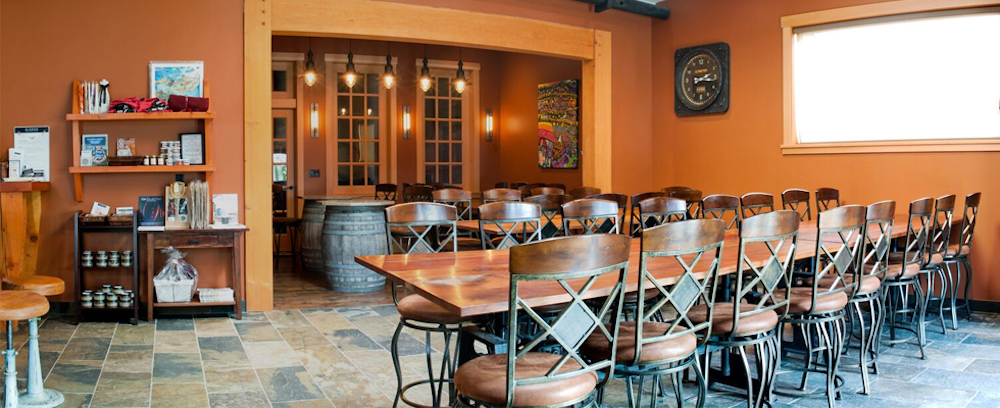
The pursuit of more natural, cleans wines includes following biodynamic farming methods and not using synthetic chemicals at all. In their cellar they use Albrigi stainless steel, terracotta amphora, Burgundy oak barrels and puncheons.
With the help of winemaker Michael Bartier, the goal is to ensure the flavours created in the vineyard from their unique Island terroir is represented in the glass.
I admire the mix of vinifera and hybrid grapes grown at the estate and used to make an interesting array of classic and unique wines at 40 Knots. I’ve enjoyed the L’Orange wine they have made for four consecutive vintages and was pleased to receive a vertical of it for this report to see the evolution of how it ages. Here’s what I liked from the new releases.
Orange crush
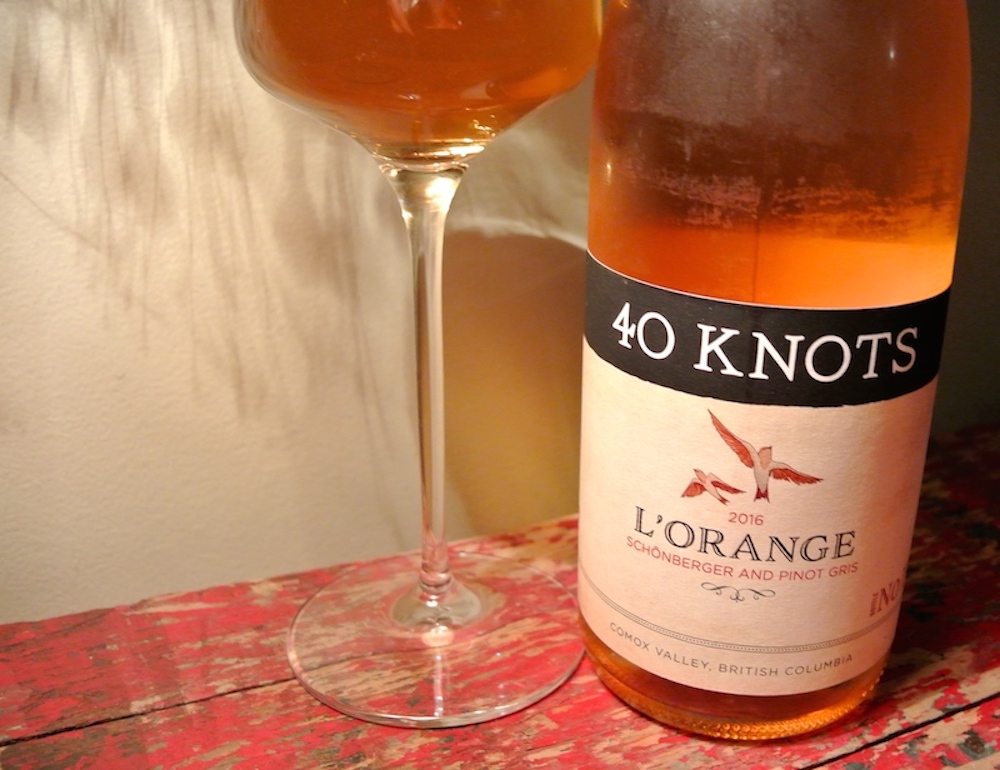
40 Knots uses primarily Schonberger for it’s L’Orange wine but for some vintages, Pinot Gris makes it into the blend. The fruit is whole berry fermented with gentle punch downs in amphora (terracotta from Florence, Italy). It’s left on the skins for three months, with no malo, no additions and sulphur levels below 10 mg/l. It’s wild fermented with no yeast added and no fining and no filtering. It is as natural as you can make a wine.
I am finding more and more that orange wines, or natural wines in general, are best enjoyed in their youth. There is no reason, in my opinion, to age them in your cellar. This vertical proofs to me that the older vintages take on a far funkier turn with bottle age: More tart dried fruits, more nuttiness, more dried herbs and more barn-yard funk notes. This might fascinate some, yet turn others off; it will depend on how your palate registers these umami/savoury/mushroomy/earthy notes. I feel they show better in their youth, with optimum natural acidity helping showcase the juicy fruits and not letting the funk dominate. Again, it’s a personal preference.
Here’s what I liked from the vertical:
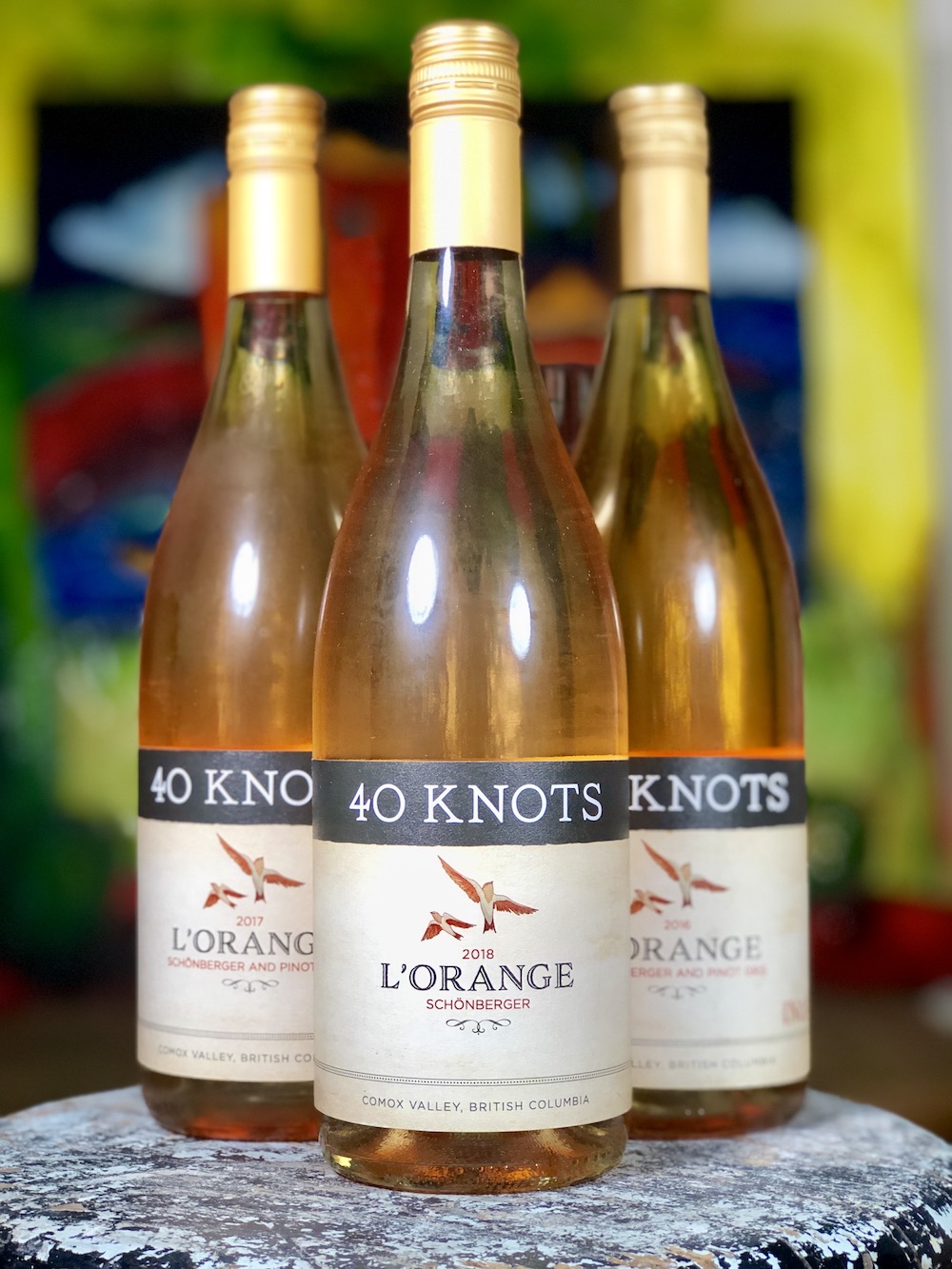
40 Knots L’Orange 2018 ($37, 89 points) — The nose immediately smells of fresh squeezed tangerine and Mandarin orange with lime, citrus zest, apricots, earth and a saline and nutty notes. It has structure on the palate, medium tannins, tart citrus, pineapple, tangerine and rides a vein of freshening acidity through the finish. The 2017 version, a blend of Schonberger and Pinot Gris, is fresher than the 2016 with plenty of Mandarin orange and citrus but shows more earthiness, more funk, black tea, herbs and dried flowers. The 2016, if you have any kicking around, should be consumed. It’s quite mature with the fruits drying up, leaving tart citrus, crushed almonds and forest floor notes. This originally had a gorgeous nose of marmalade, citrus rind, mulled apple, bin peach and tangerine. On the palate this unusual wine displayed a tasty broth of fresh orchard fruits, subtle herbs and hops(!) with soft tannic structure.
The Bubbles
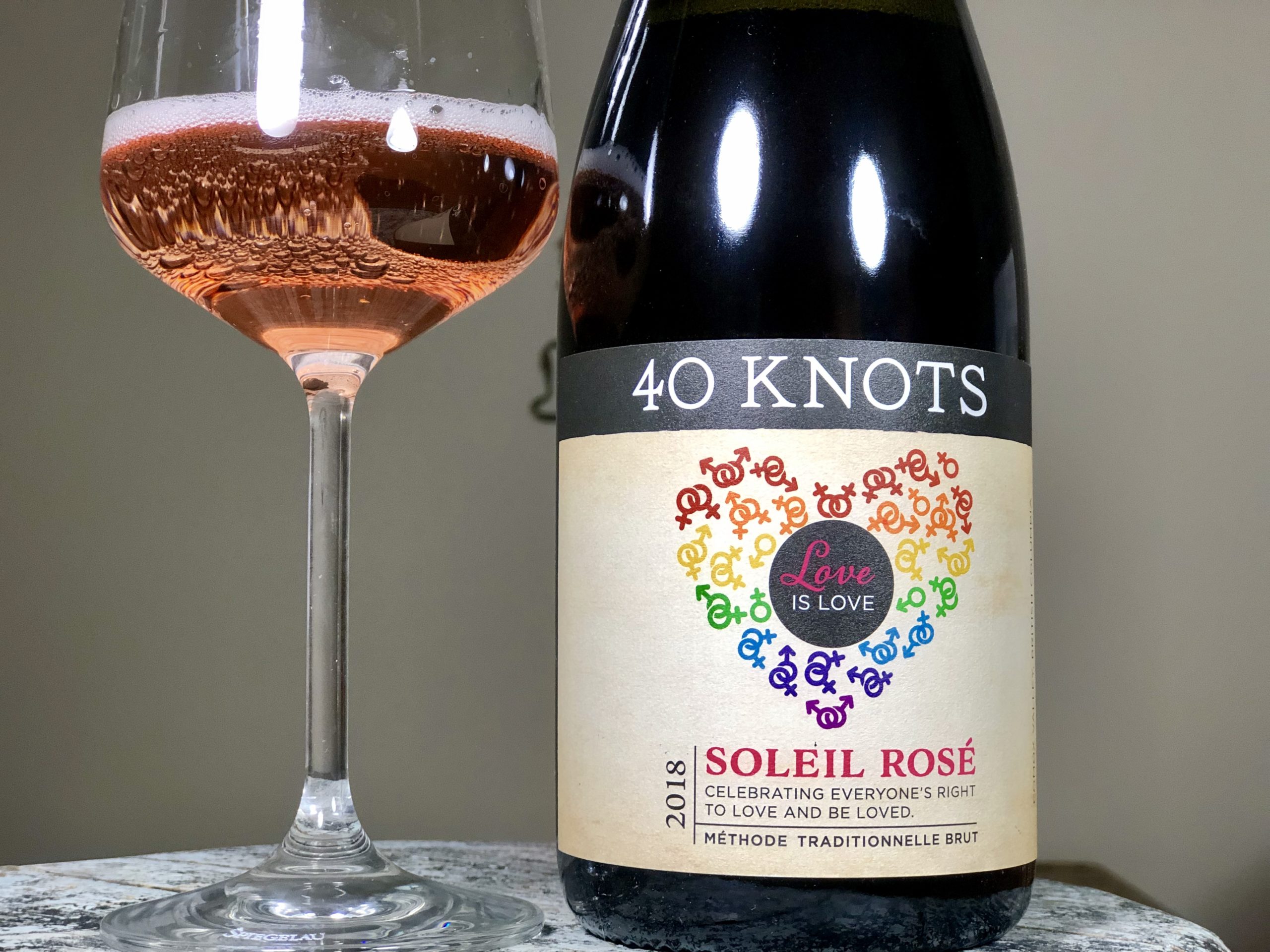
40 Knots Soleil Rosé 2018 ($37, 92 points) — This bubbly blend of Chardonnay and Pinot Noir is made in the traditional method and has an attractive nose of fresh-picked raspberries, strawberries, bramble, herbs and underlying lemon, citrus and biscuit notes. It has an energetic bead of bubbles in the glass with a basket of red berries, brioche, vibrancy and lemon accents of the fresh finish. Just a hint of sweetness, but nicely balanced.
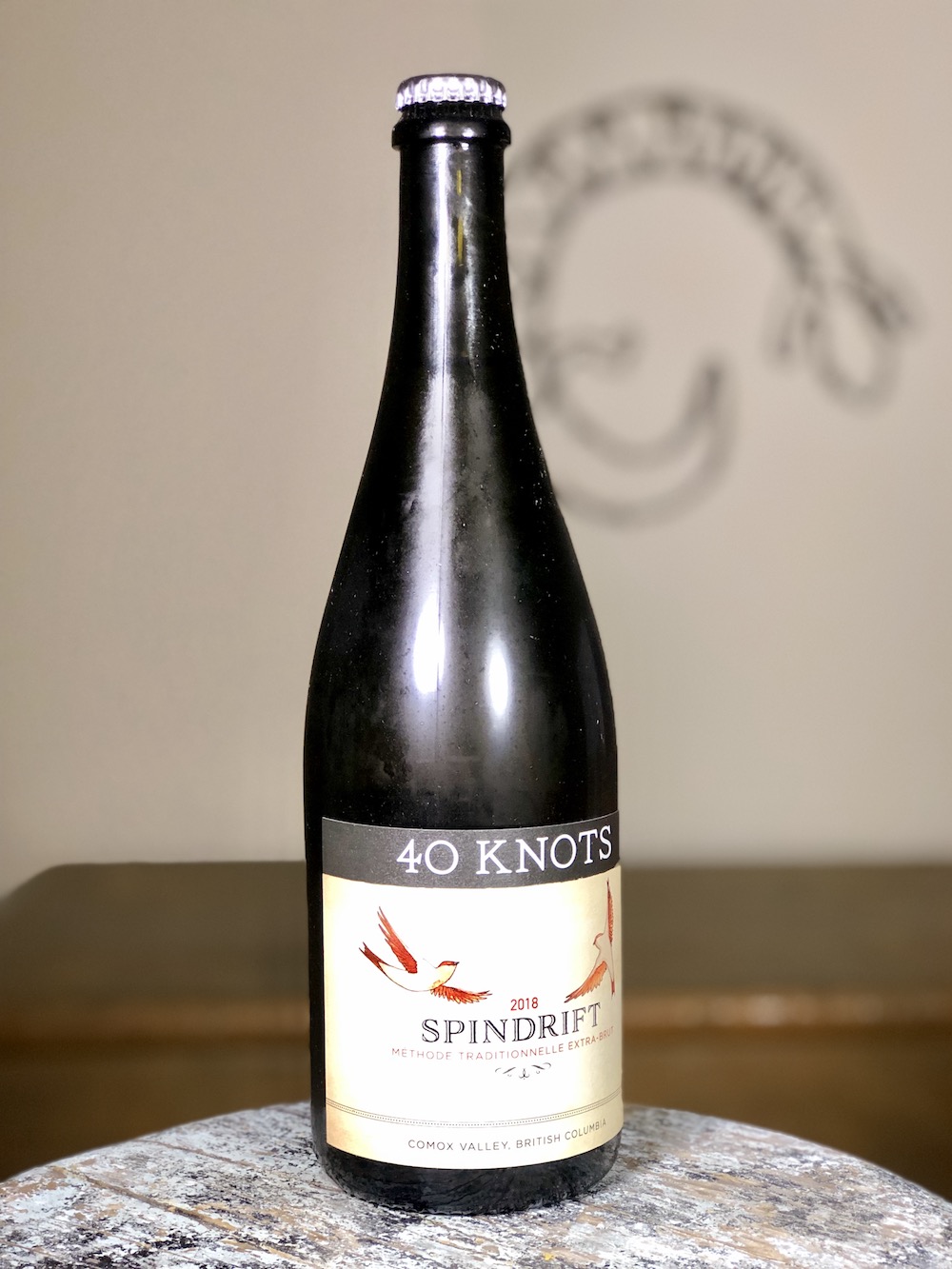
40 Knots Spindrift Brut 2018 ($37, 92 points) — Traditionally made blend of Chardonnay and Pinot with zero dosage. The nose shows brioche, creamy notes, green apple, lime, grapefruit and salinity. It’s firm, perfectly dry, and fresh with minerality, citrus, apple, bready/leesy notes and a sizzling vibrancy through finish.
The White
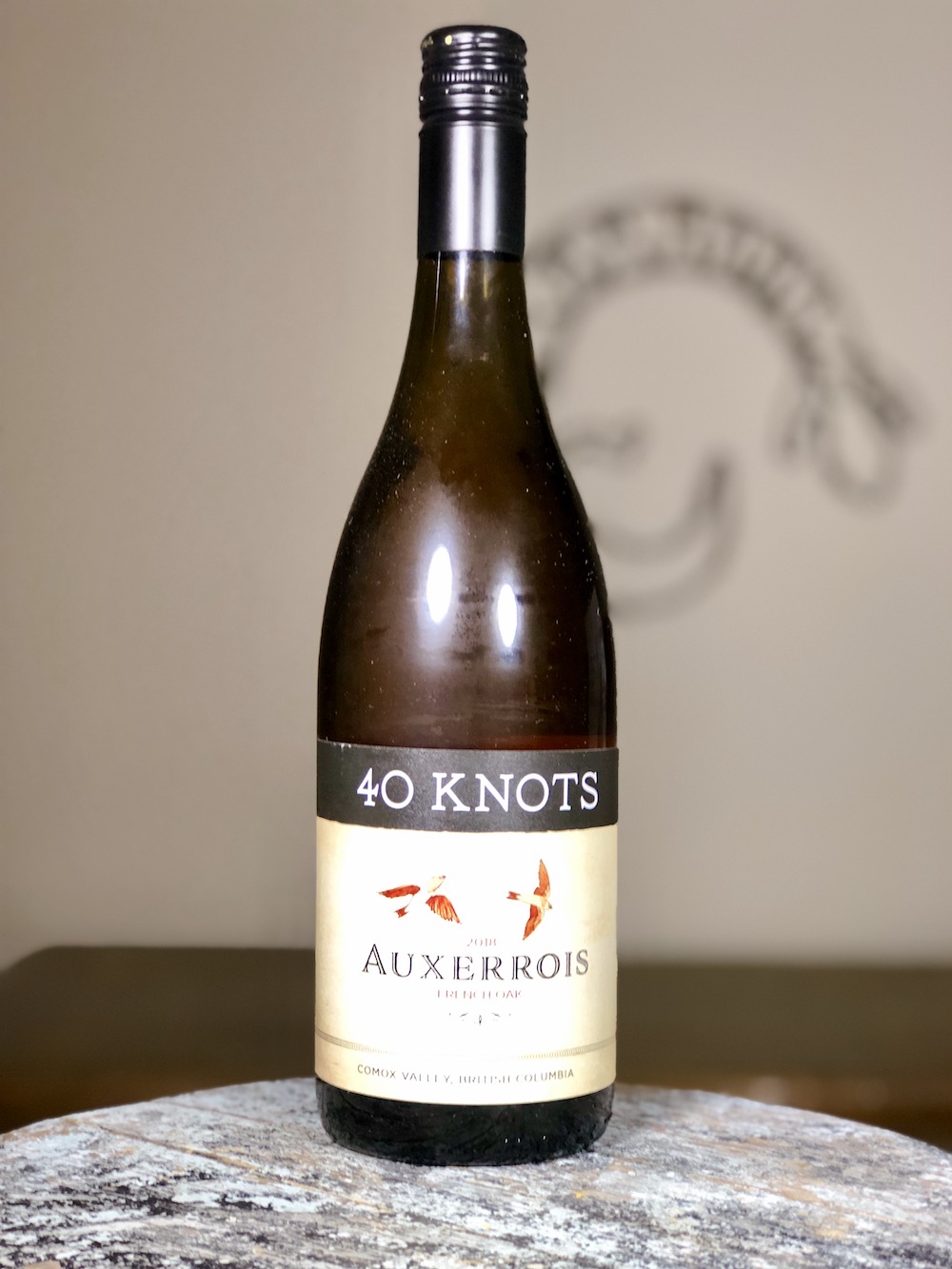
40 Knots Pinot Auxerrois 2018 ($25, 90 points) — Destemmed, crushed and left to rest on the skins for 24 hours. It was free run pressed into Burgundy oak barrels, fermented and held in oak to dry. Once a month the barrels were rolled on the lees, leaving it for seven months in oak. A lot of work has gone into this wine and it shows! What a delight. It displays a pretty pale pink hue in the glass with a nose of citrus, Bosc pear, nectarine, pineapple and fuzzy peach. It’s bright and flavourful on the palate with a range of orchard fruits, pineapple, pear, lime and subtle spice on a textured, yet vibrant frame. Perfect pairing for West Coast cuisine.
The Reds
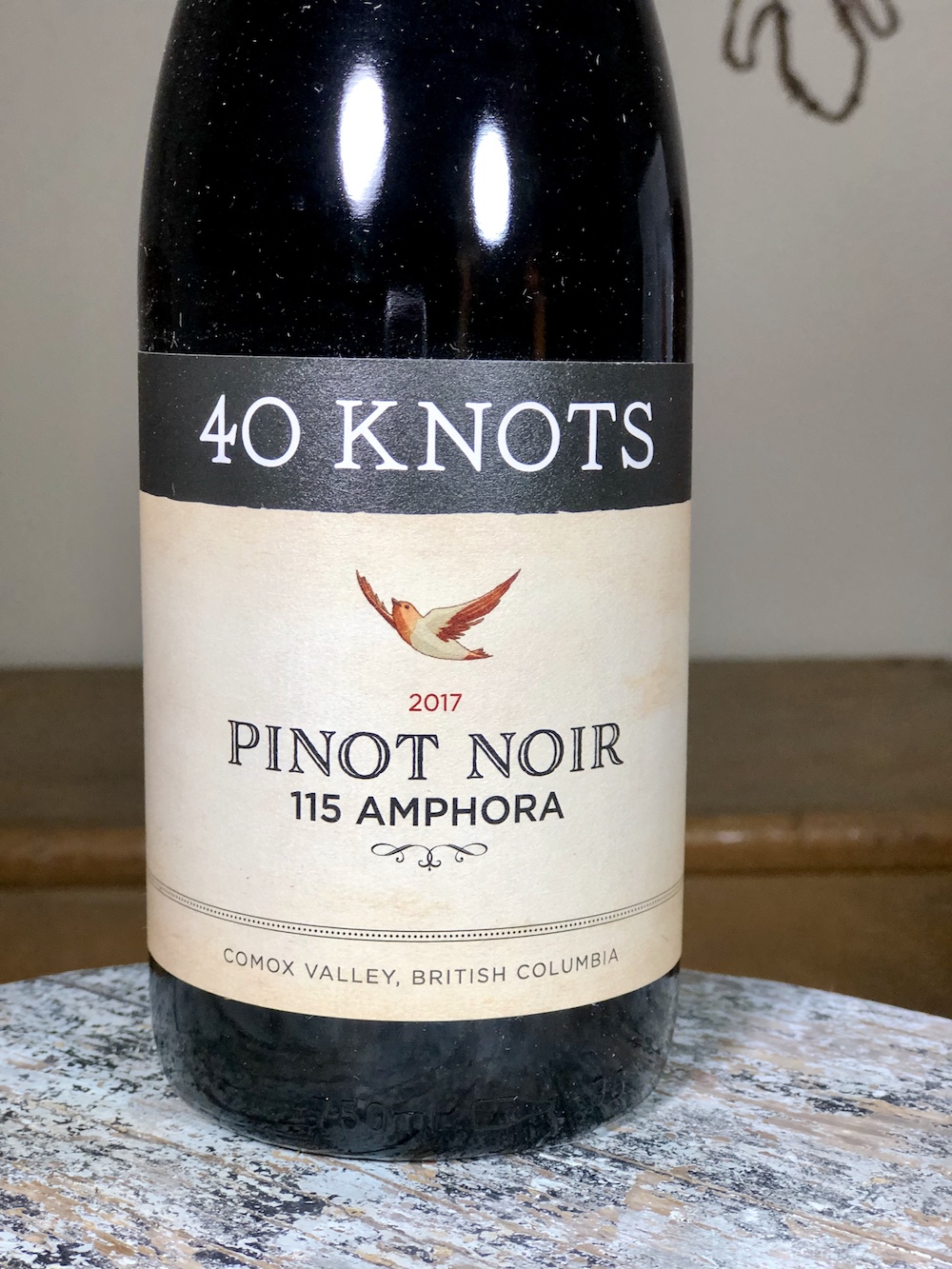
40 Knots Pinot Noir 115 Amphora 2017 ($43, 91 points) — The 115 in the name refers to the Burgundy clone of Pinot Noir, while the Amphora refers to the vessel used to ferment and age the Pinot before more aging in neutral oak. Bottled with no filtering, no fining and minimal sulphites added. What a delightful Pinot Noir with a nose of warm cherry pie, brambly wild raspberries, subtle spice notes and pure elegance. It has a silky smooth texture on the palate and displays red berries, red currants, savoury/mineral notes, bramble and bright acidity on the finish.
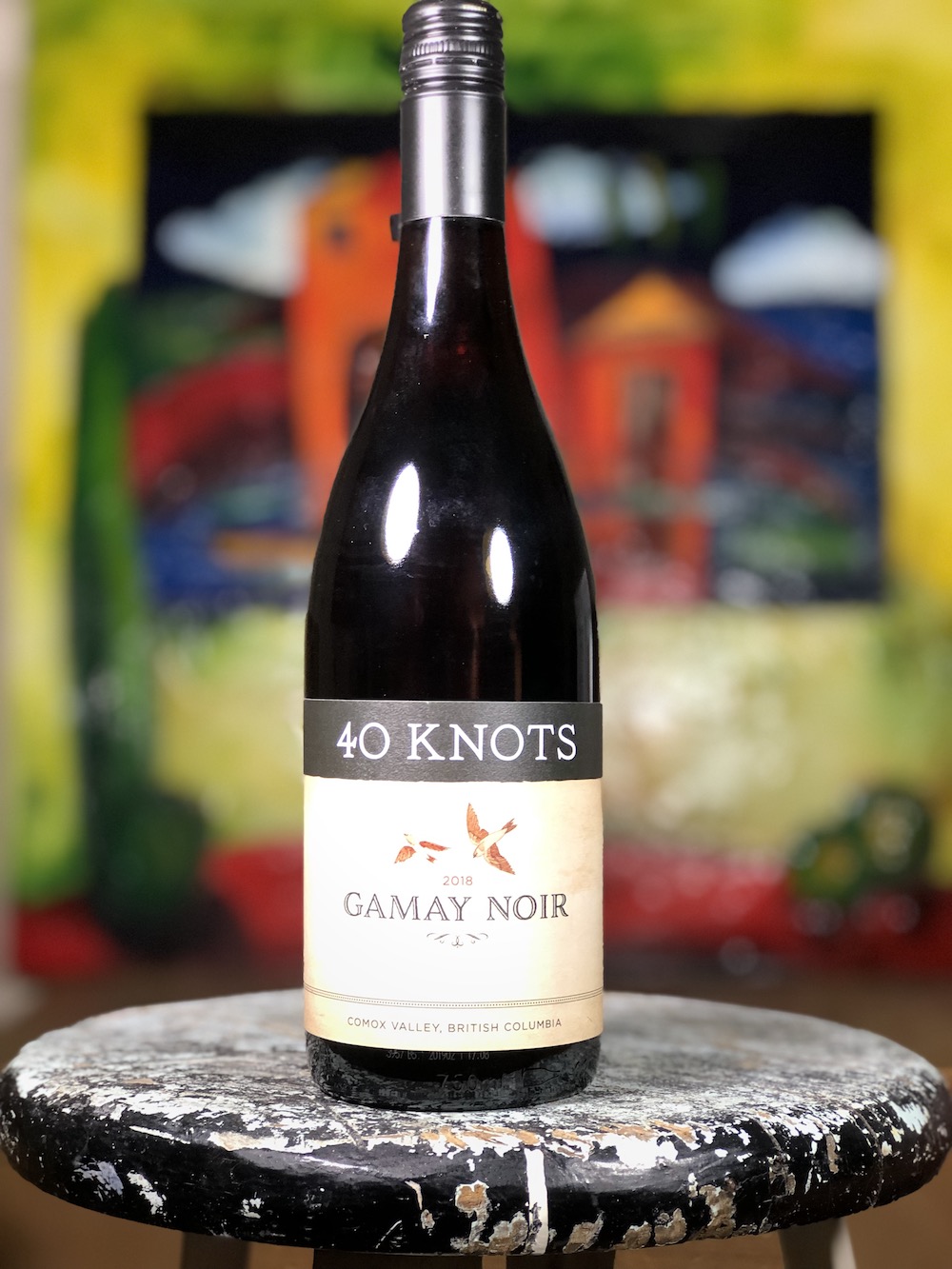
40 Knots Gamay Noir 2018 ($27, 88 points) — The wine is aged gently in French oak and has a nose of plums, cherries, touch of earth and spice. The flavours pop on the palate with brambly red berries, light tannins and a zippy vibrant finish. Serve slightly chilled for maximum impact.
Culmina’s flagship wine shines
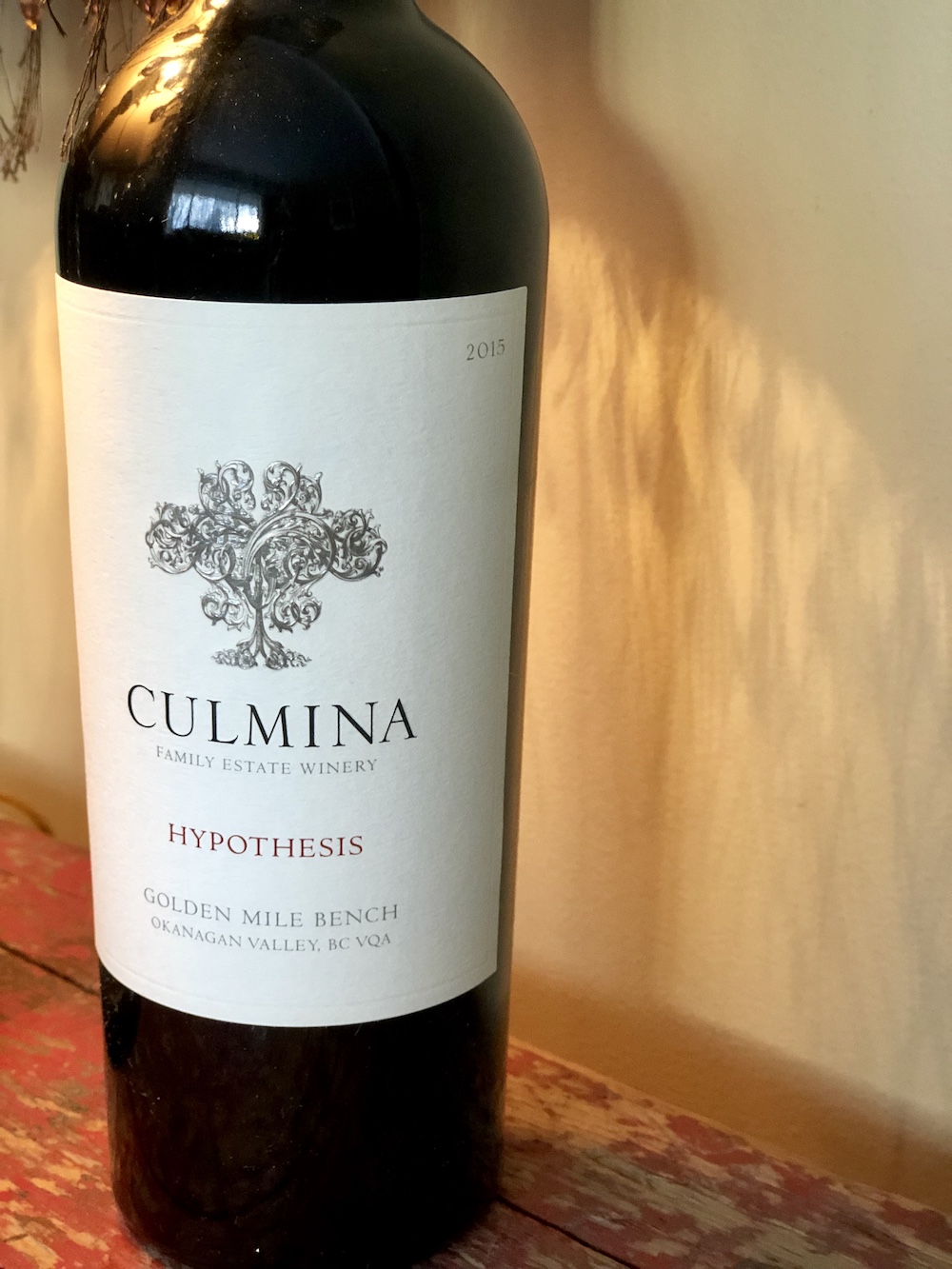
Culmina Hypothesis 2015 ($46, 93 points) — The flagship red from Culmina, a premium boutique winery founded in 2007 by Don and Elaine Triggs and sold to Arterra Canada last July, is a blend of Cabernet Franc (36%), Merlot (35%), Cabernet Sauvignon (23%), Petit Verdot (4%) and Malbec (2%) all sourced from the estate’s Arise Bench on the Golden Mile Bench. The wine is aged in combination of new and older French oak barrels for 16 months. What a gorgeous benchmark red this is, with a complex and enthralling nose savoury red berries, forest floor, wild herbs, mushrooms, wet loam, anise, dried tobacco and elegant spice notes. It’s rich and robust on the palate and nicely framed by fine-grained tannic structure that holds together the range of red and dark berries, smoky/earthy/savoury notes, anise, toasted oak and spices on a vibrant finish that lasts and lasts. A beauty that will continue to get better for 5-10 years in the cellar.
Arterra Wines Canada adds
Sandbanks Winery to its fold

Arterra Wines Canada, Inc. announced last week that it has acquired Sandbanks Winery, located in Prince Edward County, Ontario.
Sandbanks was founded in 2001 by Catherine Langlois, pictured above, and was one of the first wineries established in Prince Edward County. Langlois began by planting Baco Noir, Riesling, Pinot Noir, Vidal Blanc, Geisenheim and Marechal Foch. This has since earned the winery a loyal following and Canadian accolades for its full-bodied reds (Baco Noir) and crisp whites (Riesling).
Langlois’s vision since inception has remained constant – to produce award-winning wines that pair perfectly with food, meant to be shared in harmony with family and friends, to celebrate life.
“I have worked my entire career in the Ontario wine industry and have always admired Arterra Wines Canada for being a pioneer in Canadian wine,” said Langlois. “Since first planting almost 20 years ago, we have grown beyond my wildest expectations. Joining Arterra allows us to continue as a leading Prince Edward County winery, but with greater resources and expertise to support our people, grow our business and get our wines to more Canadians.”
The addition of Sandbanks Winery into the Arterra family of wineries complements its diverse selection of Canadian and international wines. Arterra has been making wines in the Niagara and Okanagan wine regions for over 150 years, earning it a reputation in Canada and around the world for creating award-winning, quality wines, such as Inniskillin, Jackson-Triggs and Le Clos Jordanne. This is the first winery for Arterra in Prince Edward County.
“Similar to Arterra’s start in the Niagara region planting grapes and making wine when people thought it impossible, Catherine has done the same with Sandbanks in Prince Edward County, and I personally admire her passion and vision,” said Jay Wright, president and CEO, Arterra Wines Canada, Inc. “I’m immensely proud to add Sandbanks Winery into our portfolio of wines and we look forward to working with Catherine to expand her vision and leverage her strength as an industry pioneer and grow the brands for years to come.”
— Source, Arterra Canada
Hester Creek winemaker retires

After over 14 years of crafting highly acclaimed wines for Hester Creek Estate Winery, senior winemaker Robert Summers has announced his retirement.
Originally from Niagara, Summers has had a long winemaking career, which first began in Ontario in 1987. He joined Hester Creek in May 2006 and was instrumental in overseeing the design and construction of Hester Creek’s sustainably built, state-of-the-art winery in 2008. He has led the Hester Creek winemaking team for the past 14 years, substantially expanding their portfolio of wines in that time.
“Rob has been a huge part of Hester Creek’s incredible success, in growing the company from a small 6,000 case winery to the 60,000 case production today,” said Mark Sheridan, President, Hester Creek Estate Winery. “His talents and great sense of humour will be missed by our team, and we wish him well in his well-earned retirement.”
Hester Creek’s cellar is being managed by longtime winemaker Mark Hopley and assistant winemaker Rebecca Ruggeri. Formerly with Sumac Ridge Estate Winery, Hopley has been a winemaker with Hester Creek since 2013. Last year Ruggeri was promoted to the newly created position of assistant winemaker. She has international experience working several years in the cellars and labs of premium wineries across New Zealand, Australia and California.
— Source, Hester Creek
Okanagan winemaker Ross Wise
is world’s newest Master of Wine
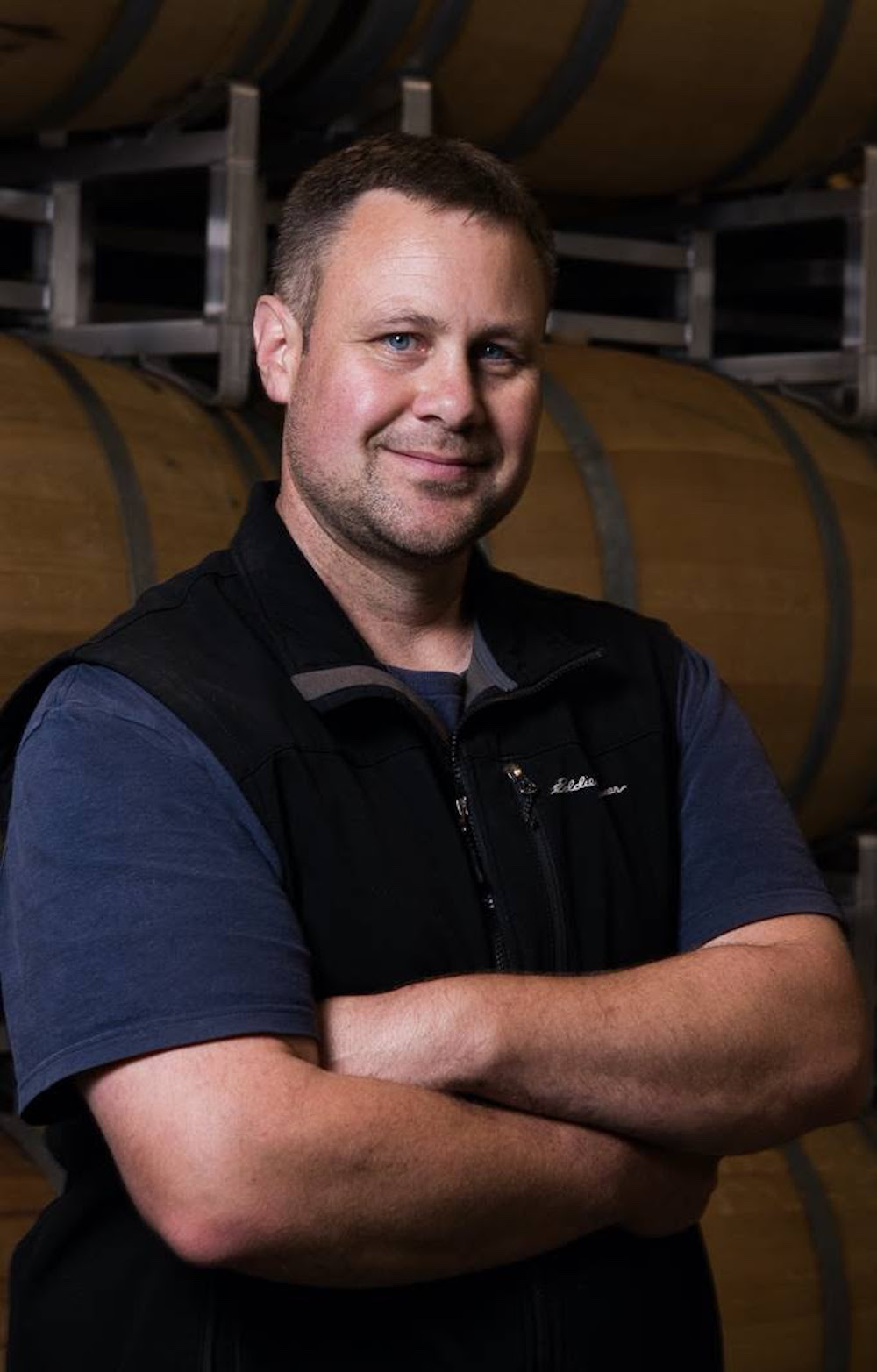
Black Hills Estate Winery winemaker Ross Wise is Canada’s newest Master of Wine and is only the seventh to be awarded the honour in Canada, and the fourth in British Columbia.
After four years of intense study and arduous sampling of thousands of wines, Wise has now earned the title of Master of Wine. The MW is a very prestigious title, only 396 people worldwide have achieved the status since the first exams began in 1953. MWs now exist in 30 different countries with only seven in Canada and 60 in total across North America.
“Working towards achieving the Master of Wine qualification has been an incredible experience. It has allowed me to greatly expand my horizons in the wine industry and connect with so many passionate wine people across the globe,” says Wise. “It is an intense program and requires a lot of hard work and commitment. I have been very lucky to have so many people supporting me throughout the journey, and I am absolutely thrilled to join the Institute of Masters of Wine!”
Wise, originally from New Zealand, holds a Bachelor of Viticulture and Advanced diploma in Wine Science from Charles Sturt University in Australia. He has worked with renowned producers in New Zealand and Ontario before the cool climate wine industry in British Columbia drew his attention.
After 16 years of winemaking, viticulture and consulting experience, Wise and his family settled in Oliver. Prior to Black Hills, Wise was head winemaker and general manager at Phantom Creek Estate. Wise is Canada’s 7th Master of Wine, adding to his WSET Level 4 Diploma in Wines and Spirits.
— Source, Black Hills Estate Winery





Comment here